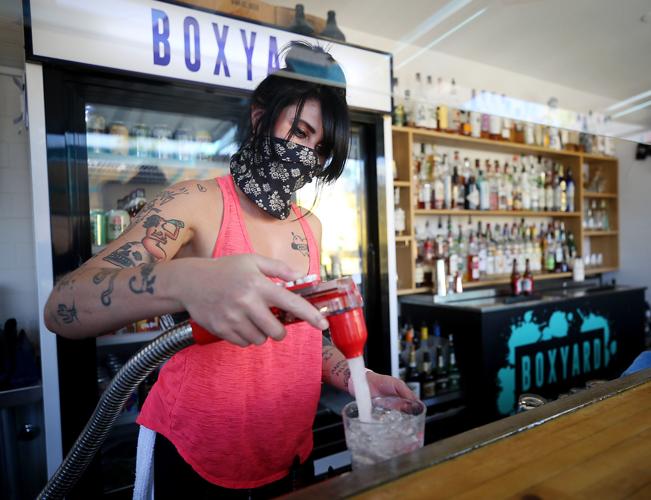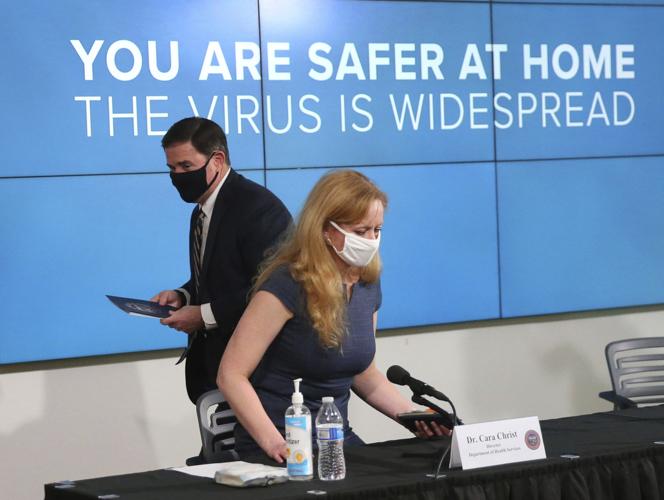Conceding he made a mistake in allowing them to reopen, Gov. Doug Ducey on Monday shuttered all bars in the state for at least the next 30 days.
Ditto gyms, water parks, movie theaters and tubing along Arizona rivers.
And schools won't open until at least Aug. 17, two weeks later than the planned start date for most districts on traditional calendars.
The moves come as Ducey acknowledged the explosion of cases of COVID-19 that started two weeks after his mid-May order reopening the state economy. That two weeks pretty much coincides with the incubation period of the virus when people are exposed.
"We're fixing it" the governor said when asked if he screwed up in letting bars reopen six weeks ago.
He separately banned gatherings of more than 50 people. Churches and political rallies are exempt.
This could put a damper on any planned Fourth of July celebrations, though he did give individual cities and towns the power to permit larger crowds, including to watch fireworks, if there are assurances there will be proper social distancing.
Public swimming pools, those run by cities or in hotels or motels, will have to restrict groups in or out of the water to no more than 10. For semi-private pools at apartment complexes and condos, owners will need to post notices about the 10-person limit.
But Ducey, who repeatedly hammers home the message that people are "safer at home," refused to reinstate his stay-at-home order. He said it's not necessary.
"The objective today is to slow the spread of this," the governor said. And Ducey said he believes the state can get infection levels back to where they were in the middle of May — when the restrictions were lifted — without an edict.
"I think Arizonans are smart and have common sense and will demonstrate responsibility," he said.
And what if the rate doesn't decline?
"I wake up every day and there is an additional set of problems," the governor responded. "And we solve them in their turn."
Back to school
Arizona Schools Chief Kathy Hoffman, in a prepared statement said she supports the two-week delay in sending students back to class.
"With COVID cases hitting new highs every week, it is clear it is not yet safe for students and teachers to return to school facilities," she said, noting that some districts with year-round schedules were set to reopen in the next few weeks.
But Hoffman said that schools are free to start distance learning earlier than Aug. 17 or to delay the start of the academic year.
Less clear, however, is how that affects the requirement for schools to be operating for 180 days to get full state funding. And that mandate was reaffirmed just a week ago when Ducey and Hoffman announced that schools needed to be open and operating for that many days if they want their share of $200 million of additional state aid that will be made available.
The delayed start will allow Tucson’s largest school district more time to prepare, including getting enough supplies like hand sanitizer, soap, masks and touchless water dispensers, said TUSD Superintendent Gabriel Trujillo.
“It's 14 days extra for us, and that 14 days could make a big difference in terms of supplies arriving,” he said. “Our biggest challenge right now is the supply chain.”
The additional time will also allow for more training for teachers to prepare for online learning and modified in-person instruction.
Pima County Schools Superintendent Dustin Williams says he appreciates the delayed start but that it should be even more flexible. He says schools need to have a 100% remote-learning option where they’ll still get full funding.
“To force schools to put the option of the five-day in-person instruction completely handcuffs them,” he said.
Trujillo is also critical of the requirement to offer 180 days of in-person instruction, which would take action from state lawmakers in a special session to change.
“I think that this crisis requires flexibility,” Trujillo said. “And we're not being given that when we're hammered into the 180 days.”
Ducey’s executive order to delay the reopening of schools calls for an analysis by the end of August on the need to waive the required number of school days.
Trujillo said Tucson Unified is preparing an emergency plan to transition the entire district online if the health crisis necessitates it, although he admits it’s not clear how schools would continue to receive funding if they ceased to offer in-person instruction.
“If we get another shotgun announcement, say the day before school, that we're going to be down for 60 days, we'll be ready to go,” he said.
Changing course
Ducey closed all bars and restaurants in March following decisions already made by the mayors of Tucson and Flagstaff.
He relented in early May, allowing sit-down dining at restaurants. Even then, however, he said that did not apply to bars.
But his administration changed course, with the Department of Liquor Licenses and Control permitting any bar to open — and serve customers — as long as food was made available. That could include anything from snacks to a food truck parked outside.
The result has been some viral videos of bars packed full of patrons, with few wearing masks or social distancing.
As recently as Friday, June 26, Ducey was sticking by his decision to permit operation of bars even as Republican counterparts in Texas and Florida shuttered them. Instead, Ducey said he would crack down on those "bad actors" who did not follow proper health protocols and work to educate all operators about safe operation.
The governor conceded that didn't work out quite the way he planned, leaving him no option but to close down anything licensed as a bar, meaning any establishment where food sales account for less than 40% of revenues.
Bars may offer pickup, delivery and drive-thru services.
"When necessary, when needed, we will do what it take to get the job done," Ducey said.
So why did it take six weeks to figure out that reopening bars was a mistake? The governor said it was all about providing clarity and guidance.
"We do want to open our economy," he said. "We just want it to be safe and we want it to be successful."
It was only when he saw the spike in infections, Ducey said, "we had to adjust this."
Still, the governor was not willing to say he had any regrets about how he has handled the pandemic.
"No decision has been easy since we declared the emergency on March 11," he said.
"I have made what I believe, in my heart of hearts, is the best possible decision to protect people's lives in Arizona and to protect livelihoods in the state," the governor continued. "That has been the standard."
As of Monday there were 1,588 deaths in Arizona and 74,533 confirmed cases.
Those numbers included no new deaths reported and just 625 new cases. But state health officials said that latter figure was because one laboratory had not met the deadline for filing reports.
By contrast, there were 3,858 cases reported the day before.
Chris Minnick, spokesman for the Department of Health Services, said the positive tests will end up on Tuesday's numbers.
As to the deaths, Minnick said that is unrelated to the problem with the laboratories. But he said that figures after weekends often tend to be lower.
Separately, state Health Director Dr. Cara Christ said her agency is activating its crisis standard of care plans as hospitals are approaching capacity. That requires facilities to address space, staff and resource issues as necessary.
It also says that those approaching capacity must cease all surgeries except those that are essential and do not impair the care of other patients.
Photos for May 29: Tucson gets by during Coronavirus Pandemic
Tucson gets by during coronavirus pandemic
Updated
The iconic Casa Molina bull and matador statue both sport masks on the first full week of the loosening of COVID19 restrictions, May 23, 2020, Tucson, Ariz. The bull previously had a mask on the testicles.
Tucson gets by during coronavirus pandemic
Updated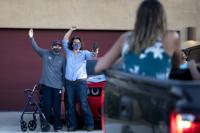
Michelle Leon Cordova, right, mother, and her son Sahuarita High School senior Lino Cordova, whom is fighting cancer, wave at staff members from Diamonds Children Center, friends and the Marana Police Department during a car parade, celebrating Lino's graduation, outside of his home on May 13, 2020 in Sahuarita, Ariz. Cordova stood on the sidewalk while the team from Diamond Children Center, friends and the Marana police department gave Cordova a graduation gar parade. Cordova was given a gift basket with his favorite snacks, gift cards as well as other items he enjoys. The car parade, also, celebrated another graduating senior fighting cancer from Empire High School, Noah Nieto. Nieto, also, received a gift basket with snacks, gift cards and other items Lino enjoys.
Tucson gets by during coronavirus pandemic
Updated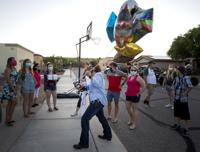
Michelle Leon Cordova, right, mother, brings celebration balloons to a car after staff members from Diamonds Children Center, friends and the Marana Police Department celebrate Sahuarita High School senior Lino Cordova, whom is fighting cancer, graduation with a car parade outside of his home on May 13, 2020 in Sahuarita, Ariz. Cordova stood on the sidewalk while the team from Diamond Children Center, friends and the Marana police department gave Cordova a graduation gar parade. Cordova was given a gift basket with his favorite snacks, gift cards as well as other items he enjoys. The car parade, also, celebrated another graduating senior fighting cancer from Empire High School, Noah Nieto. Nieto, also, received a gift basket with snacks, gift cards and other items Lino enjoys.
Tucson gets by during coronavirus pandemic
Updated
Personnel from Tucson Medical Center line the heliport to watch A-10's from Davis-Monthan Air Force Base's 355th Wing and F-16's from the Arizona Air National Guard's 162nd Wing make a pass over the facility, one leg of an area wide community flyover, May 14, 2020, Tucson, Ariz.
Tucson gets by during coronavirus pandemic
Updated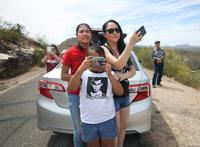
Nancy Celix-Campos, right, a respitory therapist at Tucson Medical Center, watches the military flyover with her daughters, Giana, 12, and Jazmyn, 8, from Sentinel Peak on May 14, 2020. Two F-16 Fighting Falcons from Arizona Air National GuardÕs 162nd Wing and two A-10 Thunderbolt II's from the 355th Wing, assigned to Davis-Monthan Air Force Base, fly over Tucson area hospitals to honor healthcare personnel and first responders as they are some of the frontline workers dealing with the coronavirus disease (COVID-19) head on. "It's been an exhausting two to three months," says Campos, "it's pretty cool, I like how they're going by each hospital."
Tucson gets by during coronavirus pandemic
Updated
Two F-16 Fighting Falcons from Arizona Air National Guard’s 162nd Wing and two A-10 Thunderbolt II's from the 355th Wing, assigned to Davis-Monthan Air Force Base, fly over Northwest Medical Center north of Tucson on May 14, 2020.
Tucson gets by during coronavirus pandemic
Updated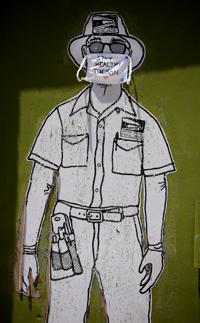
A letter carrier portrait on the Ok Market building, located in the Armory Park neighborhood, is adorned with a face mask on May 18, 2020.
Tucson gets by during coronavirus pandemic
Updated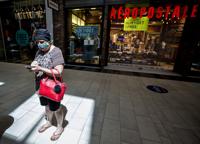
Rosemary Garcia waits for a family member outside of a store at Park Place Mall, 5870 E. Broadway Blvd., in Tucson, Ariz. on May 19, 2020. Malls reopened today under CDC guidelines and Gov. Ducey's new rules for businesses due to the Coronavirus pandemic. Park Place Mall has signs throughout the mall reminding customers to keep a six feet distance as well as hand sanitizer stations near each entrance. About half of the tables in the food court have been removed to allow for social distances as well as less than half of the stores have opened with new guidelines. Of the stores open, only 10 customers are allowed to shop in each store at a time.
Tucson gets by during coronavirus pandemic
Updated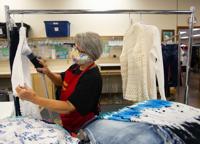
Pat Schlote steams clothing before it is put on the sales floor at the Golden Goose Thrift Shop in Catalina, Ariz., on May 21, 2020.
Tucson gets by during coronavirus pandemic
Updated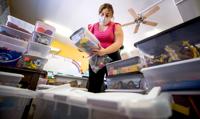
Ada Contreras, teaching assistant, looks through containers while reorganizing toys at Herencia Guadalupana Lab School, 6740 S. in Tucson, Ariz. on May 21, 2020. As Child care centers begin to re-open when they are ready, Herencia Guadalupana Lab School is reorganizing and cleaning everything in the facility before re-opening on June 2. To allow for social distancing and decrease the amount of items children touch, Herencia Guadalupana Lab School has sheds where items will go as well as placing items in containers organized by category.
Tucson gets by during coronavirus pandemic
Updated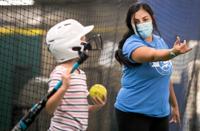
Jen Martinez, right, softball coach, teaches Skylar Reilly about hitting during a session at Centerfield Baseball Academy, 5120 S. Julian Dr., in Tucson, Ariz. on May 21, 2020. After re-opening on Monday, Centerfield Baseball Academy has implemented new policies in response to the Coronavirus Pandemic such as wearing masks, cleaning, signage, hand sanitizer and limiting the amount of people inside the facility.
Tucson gets by during coronavirus pandemic
Updated
Karl Bosma, left, and George Cantua, with facilities and maintenance, lay down stickers to mark six-foot separation distance around one of the baggage carousels, part of the efforts at Tucson International Airport to work within the restrictions of COVID19, May 22, 2020, Tucson, Ariz.
Tucson gets by during coronavirus pandemic
Updated
A lone passenger waits for a flight near one of the shuttered restaurants in the B Gates before Memorial Day at Tucson International Airport on May 22, 2020.
Tucson gets by during coronavirus pandemic
Updated
Drew Cooper on the stage in the St. Philip's Plaza courtyard, May 22, 2020, Tucson, Ariz., where live music is back on the schedule.
Tucson gets by during coronavirus pandemic
Updated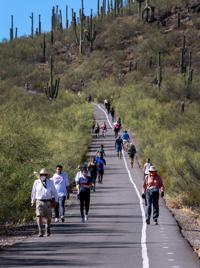
Many people visit Tumamoc Hill during the first day of Tumamoc's re-opening in Tucson, Ariz. on May 25, 2020. After being closed due to the Coronavirus pandemic, Tumamoc Hill re-opened with some modifications. There are hand sanitizer stations throughout the hike to the top as well as arrows, spaced 10-ft apart, lined up and down the hill. Some runners, hikers and walkers are also wearing masks during their hike. "The steps we are taking aim to provide our community with needed exercise, connection to our beautiful desert and a sense of comfort in such a trying time, while balancing the fact that gathering as a community endangers each of us and our loved ones. This is an unprecedented challenge that we are taking extremely seriously," said Benjamin T. Wilder, director of Tumamoc Hill. Visitors are also asked to limit their group to three people and to not touch the gate at the top of the hill- a tradition for some who make it to the top. "This is a time when we need to establish new traditions and adapt in a creative manner that embraces empathy, unity, care and patience," Wilder said.
Tucson gets by during coronavirus pandemic
Updated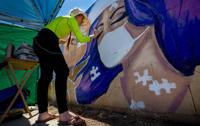
Pen Macias, artist, works on part 2 of a mural for a client on E. Broadway Rd., between S. Columbus Blvd. and S. Alvernon Way, in Tucson, Ariz. on May 25, 2020. Macias, known as The Desert Pen, has been working on her clients mural for the past three months. "It's the one thing I love, I have a passion for and the only thing I could be happy doing," said Macias. The mural represents her client, a single mother of four who works in the health care field. One half of the mural is dedicated to the connection between mothers and their children. The other half is dedicated to the connection between nurses and patients. The client wanted some positivity in the mural to show how nurses give a piece of themselves to their patients hence the puzzle pieces in the nurse and the patients, said Macias.
Tucson gets by during coronavirus pandemic
Updated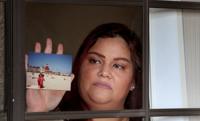
Christina Cortinas, posing at her home, May 28, 2020, Tucson, Ariz., with a photo of her and her mother, Catherine Rodriguez, in San Diego, 1991. Rodriguez is currently in assisted living and fighting COVID19. Cortinas hasn't seen her mother in months, the longest such span in her life.
Tucson gets by during coronavirus pandemic
Updated
Ruben Lopez looks through handouts while attending a Eviction Resource Fair with his family outside the Pima County Justice Court.


